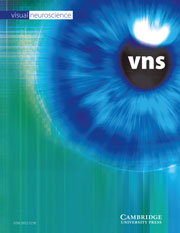Crossref Citations
This article has been cited by the following publications. This list is generated based on data provided by
Crossref.
Liu, Q.
Londraville, R.L.
Azodi, E.
Babb, S.G.
Chiappini-Williamson, C.
Marrs, J.A.
and
Raymond, P.A.
2002.
Up-regulation of Cadherin-2 and Cadherin-4 in Regenerating Visual Structures of Adult Zebrafish.
Experimental Neurology,
Vol. 177,
Issue. 2,
p.
396.
Novince, Z.M.
Azodi, E.
Marrs, J.A.
Raymond, P.A.
and
Liu, Q.
2003.
Cadherin expression in the inner ear of developing zebrafish.
Gene Expression Patterns,
Vol. 3,
Issue. 3,
p.
337.
Malicki, Jarema
Jo, Hakryul
and
Pujic, Zac
2003.
Zebrafish N-cadherin, encoded by the glass onion locus, plays an essential role in retinal patterning.
Developmental Biology,
Vol. 259,
Issue. 1,
p.
95.
Liu, Q.
Kerstetter, A.E.
Azodi, E.
and
Marrs, J.A.
2003.
Cadherin‐1, ‐2, and ‐11 expression and cadherin‐2 function in the pectoral limb bud and fin of the developing zebrafish.
Developmental Dynamics,
Vol. 228,
Issue. 4,
p.
734.
Liu, Q.
Ensign, R.D.
and
Azodi, E.
2003.
Cadherin-1, -2 and -4 expression in the cranial ganglia and lateral line system of developing zebrafish.
Gene Expression Patterns,
Vol. 3,
Issue. 5,
p.
653.
Liu, Q.
and
Londraville, R. L.
2003.
Using the adult zebrafish visual system to study cadherin-2 expression during central nervous system regeneration.
Methods in Cell Science,
Vol. 25,
Issue. 1-2,
p.
71.
Masai, Ichiro
Lele, Zsolt
Yamaguchi, Masahiro
Komori, Atsuko
Nakata, Asuka
Nishiwaki, Yuko
Wada, Hironori
Tanaka, Hideomi
Nojima, Yasuhiro
Hammerschmidt, Matthias
Wilson, Stephen W.
and
Okamoto, Hitoshi
2003.
N-cadherin mediates retinal lamination, maintenance of forebrain compartments and patterning of retinal neurites.
Development,
Vol. 130,
Issue. 11,
p.
2479.
Kerstetter, A.E.
Azodi, E.
Marrs, J.A.
and
Liu, Q.
2004.
Cadherin‐2 function in the cranial ganglia and lateral line system of developing zebrafish.
Developmental Dynamics,
Vol. 230,
Issue. 1,
p.
137.
Liu, Q
Azodi, E
Kerstetter, A.E
and
Wilson, A.L
2004.
Cadherin-2 and cadherin-4 in developing, adult and regenerating zebrafish cerebellum.
Developmental Brain Research,
Vol. 150,
Issue. 1,
p.
63.
Liu, Qin
Marrs, James A.
Azodi, Elaheh
Kerstetter, Amber E.
Babb, Sherry G.
and
Hashmi, Lala
2004.
Differential expression of cadherins in the developing and adult zebrafish olfactory system.
Journal of Comparative Neurology,
Vol. 478,
Issue. 3,
p.
269.
Babb, Sherry G.
Kotradi, Shannon M.
Shah, Bijal
Chiappini‐Williamson, Christin
Bell, Lauren N.
Schmeiser, Glen
Chen, Elbert
Liu, Qin
and
Marrs, James A.
2005.
Zebrafish R‐cadherin (Cdh4) controls visual system development and differentiation.
Developmental Dynamics,
Vol. 233,
Issue. 3,
p.
930.
Ruan, Gui
Wedlich, Doris
and
Koehler, Almut
2006.
Xenopus cadherin-6 regulates growth and epithelial development of the retina.
Mechanisms of Development,
Vol. 123,
Issue. 12,
p.
881.
Raymond, Pamela A
Barthel, Linda K
Bernardos, Rebecca L
and
Perkowski, John J
2006.
Molecular characterization of retinal stem cells and their niches in adult zebrafish.
BMC Developmental Biology,
Vol. 6,
Issue. 1,
Bagatto, Brian
Francl, Jessie
Liu, Bei
and
Liu, Qin
2006.
Cadherin2 (N-cadherin) plays an essential role in zebrafish cardiovascular development.
BMC Developmental Biology,
Vol. 6,
Issue. 1,
Babb-Clendenon, Sherry
Shen, Yu-chi
Liu, Qin
Turner, Katharyn E.
Mills, M. Susan
Cook, Greg W.
Miller, Caroline A.
Gattone, Vincent H.
Barald, Kate F.
and
Marrs, James A.
2006.
Cadherin-2 participates in the morphogenesis of the zebrafish inner ear.
Journal of Cell Science,
Vol. 119,
Issue. 24,
p.
5169.
Harrington, Michael J
Hong, Elim
Fasanmi, Oluwafoyinsa
and
Brewster, Rachel
2007.
Cadherin-mediated adhesion regulates posterior body formation.
BMC Developmental Biology,
Vol. 7,
Issue. 1,
Aquilina-Beck, Allisan
Ilagan, Kristine
Liu, Qin
and
Liang, Jennifer O
2007.
Nodal signaling is required for closure of the anterior neural tube in zebrafish.
BMC Developmental Biology,
Vol. 7,
Issue. 1,
Liu, Q.
Frey, R.A.
Babb-Clendenon, S.G.
Liu, B.
Francl, J.
Wilson, A.L.
Marrs, J.A.
and
Stenkamp, D.L.
2007.
Differential expression of photoreceptor-specific genes in the retina of a zebrafish cadherin2 mutant glass onion and zebrafish cadherin4 morphants.
Experimental Eye Research,
Vol. 84,
Issue. 1,
p.
163.
Tanaka, Masayuki
Murayama, Daisuke
Nagashima, Mikiko
Higashi, Tomomi
Mawatari, Kazuhiro
Matsukawa, Toru
and
Kato, Satoru
2007.
Purpurin expression in the zebrafish retina during early development and after optic nerve lesion in adults.
Brain Research,
Vol. 1153,
Issue. ,
p.
34.
Ghai, Kanika
Stanke, Jennifer J.
and
Fischer, Andy J.
2008.
Patterning of the circumferential marginal zone of progenitors in the chicken retina.
Brain Research,
Vol. 1192,
Issue. ,
p.
76.

